Charles E W Bean, Diaries, AWM38 3DRL 606/251/1 - 1915 - 1936 - Part 6
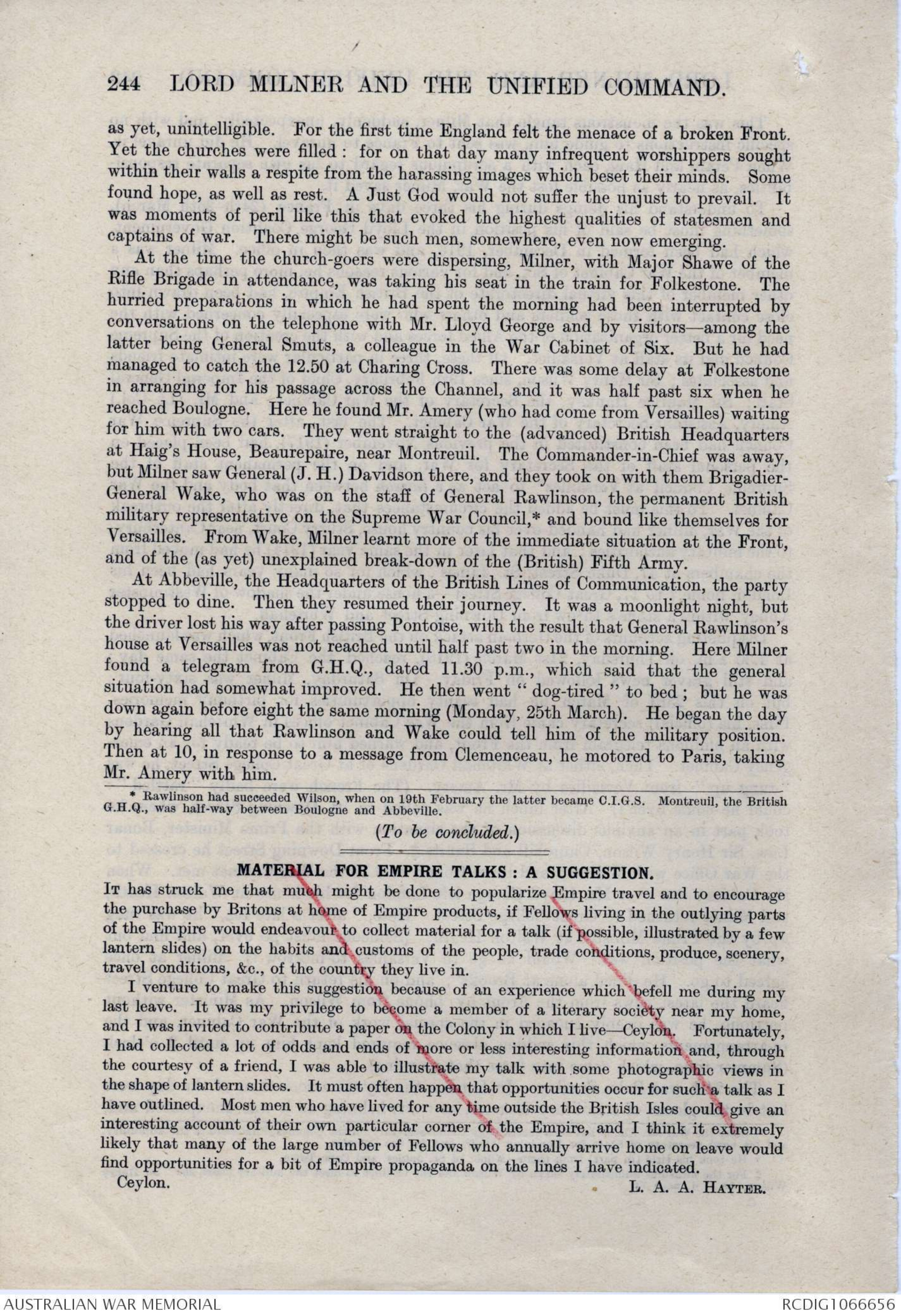
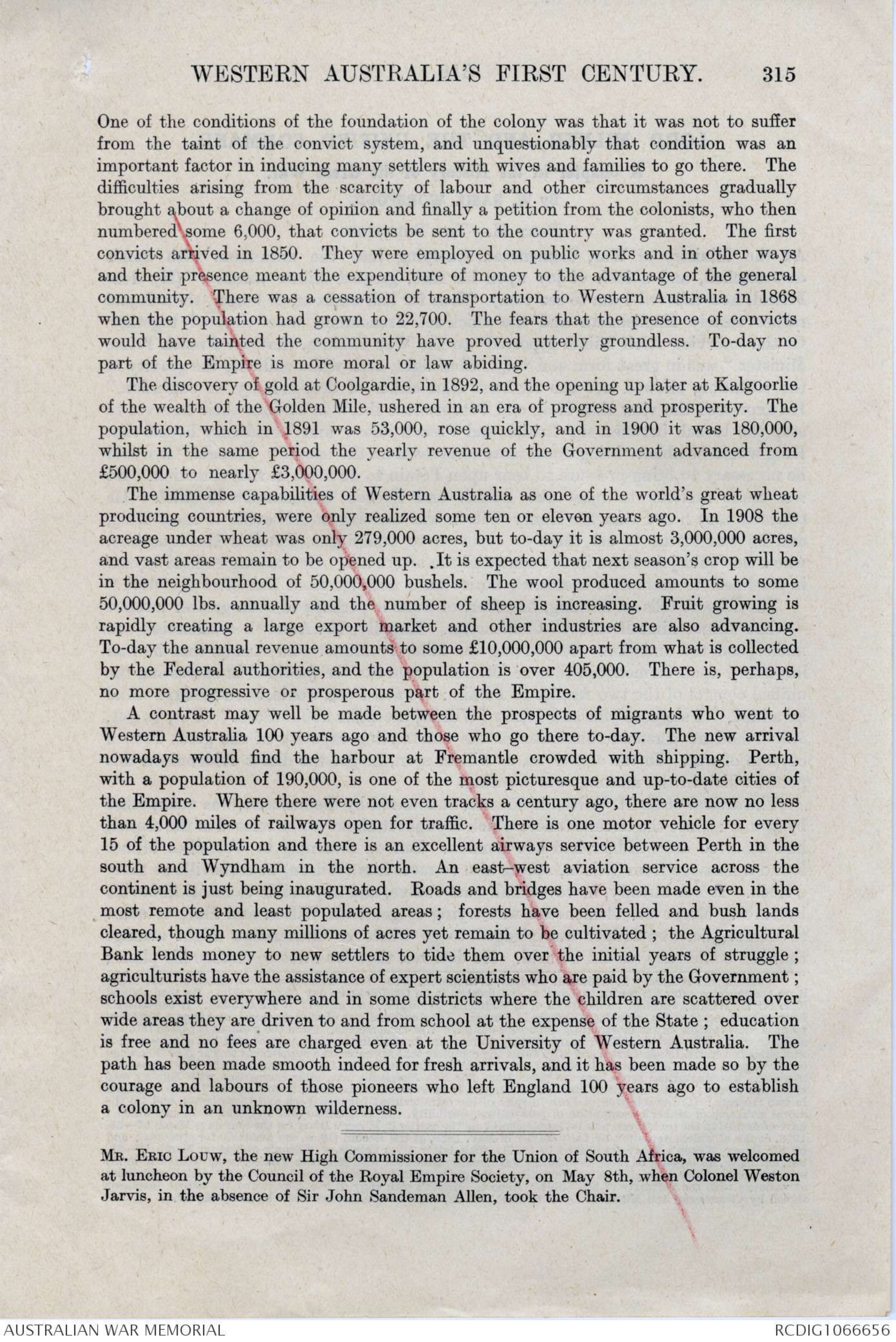
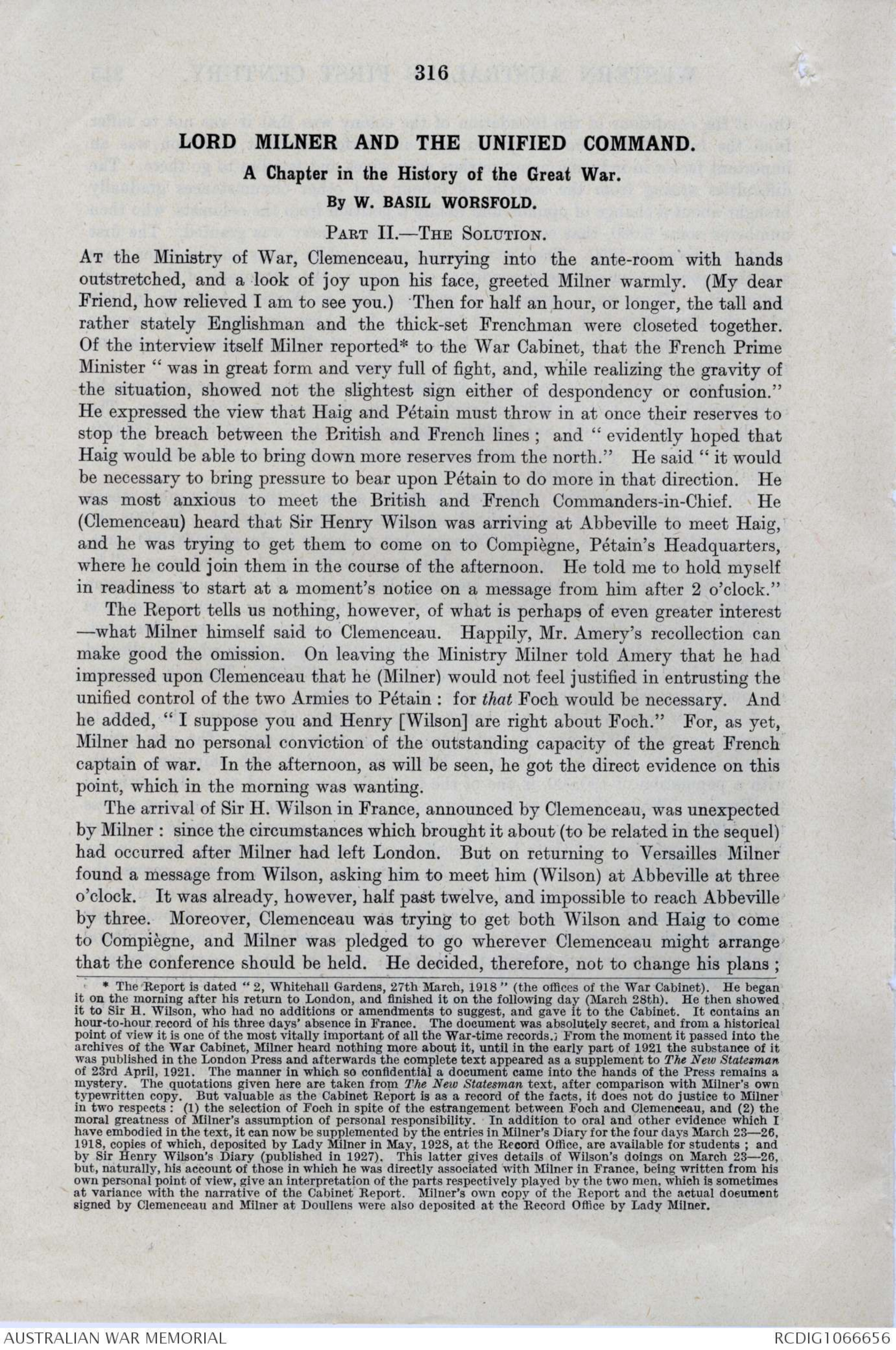
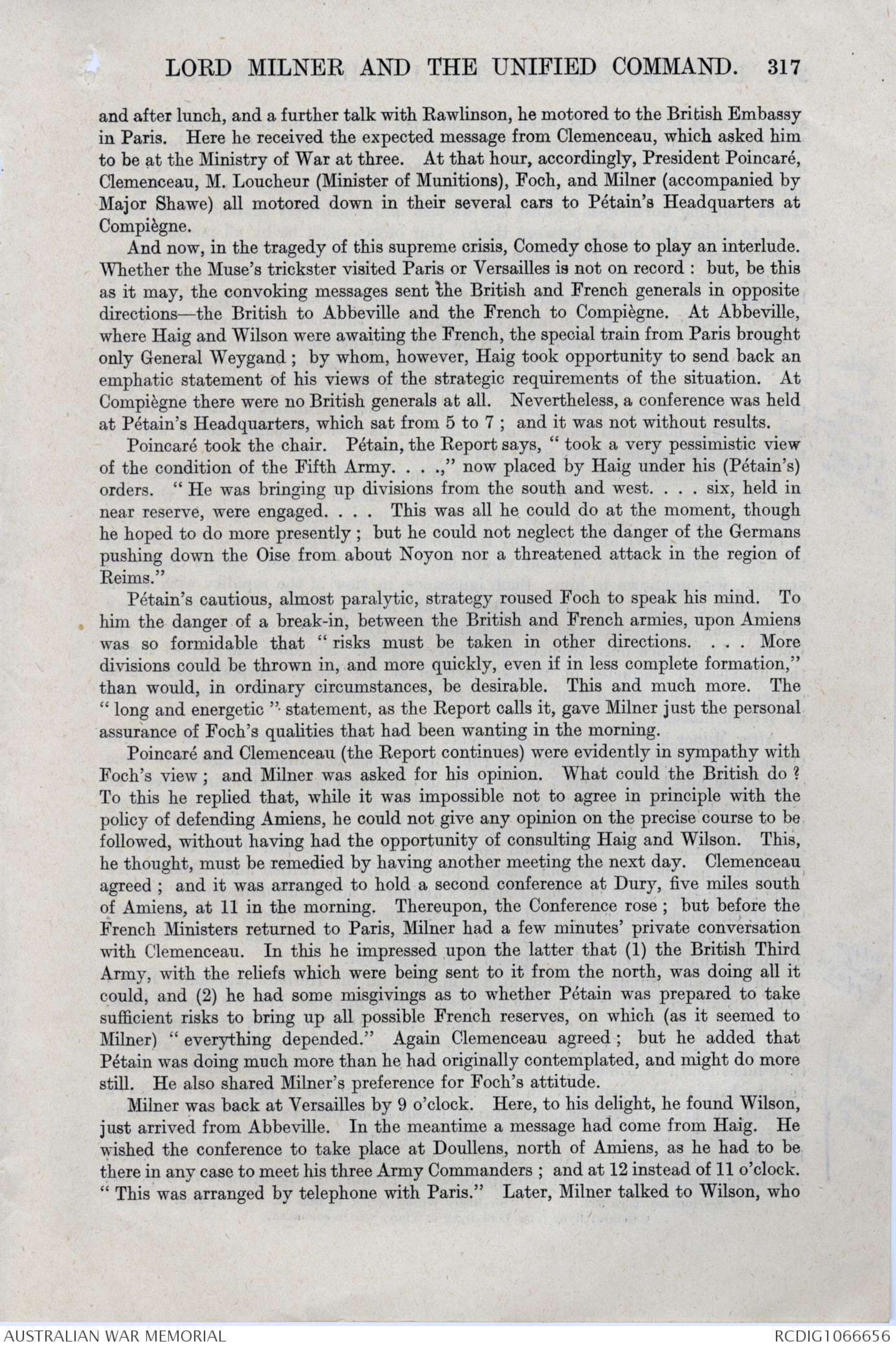
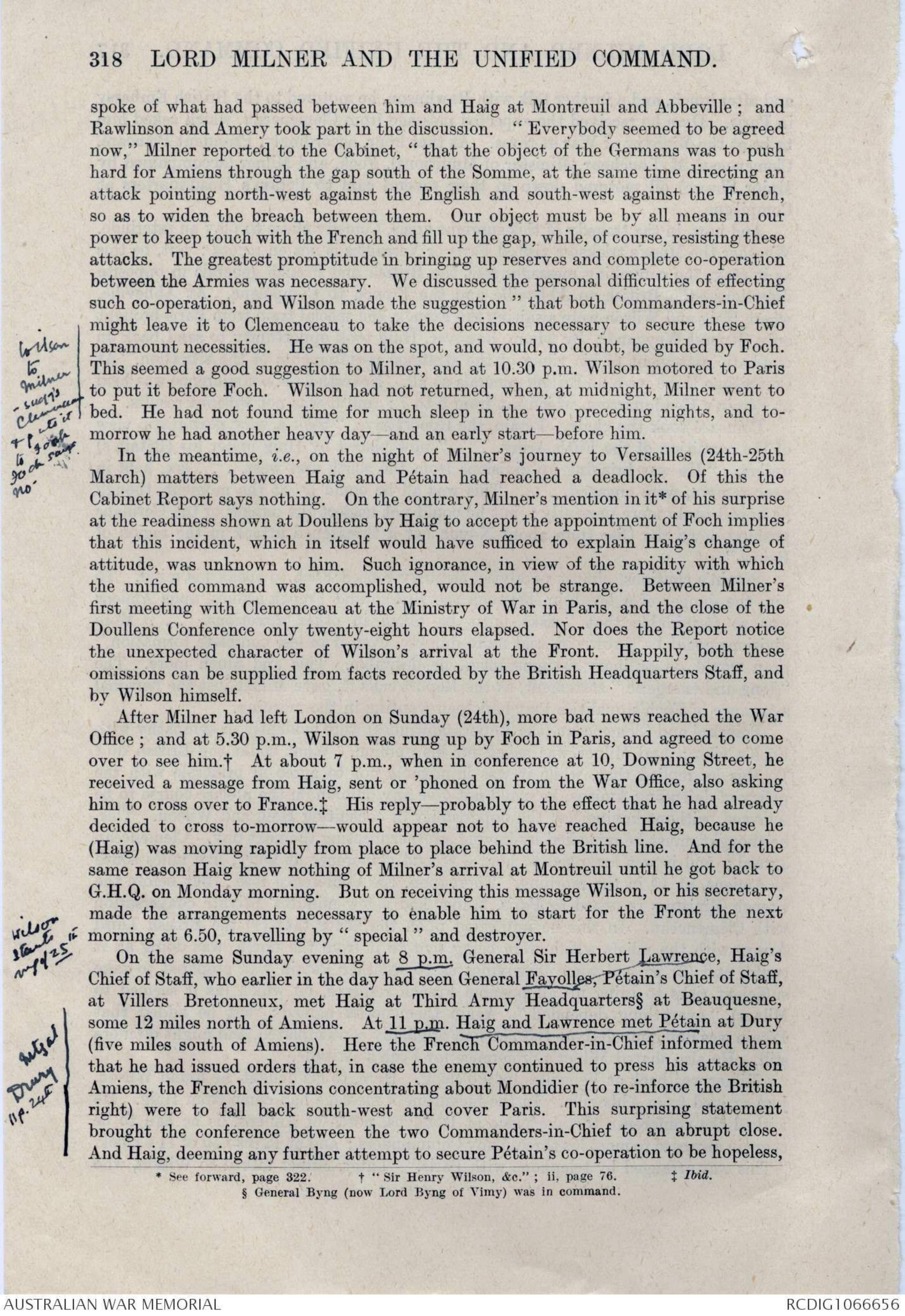
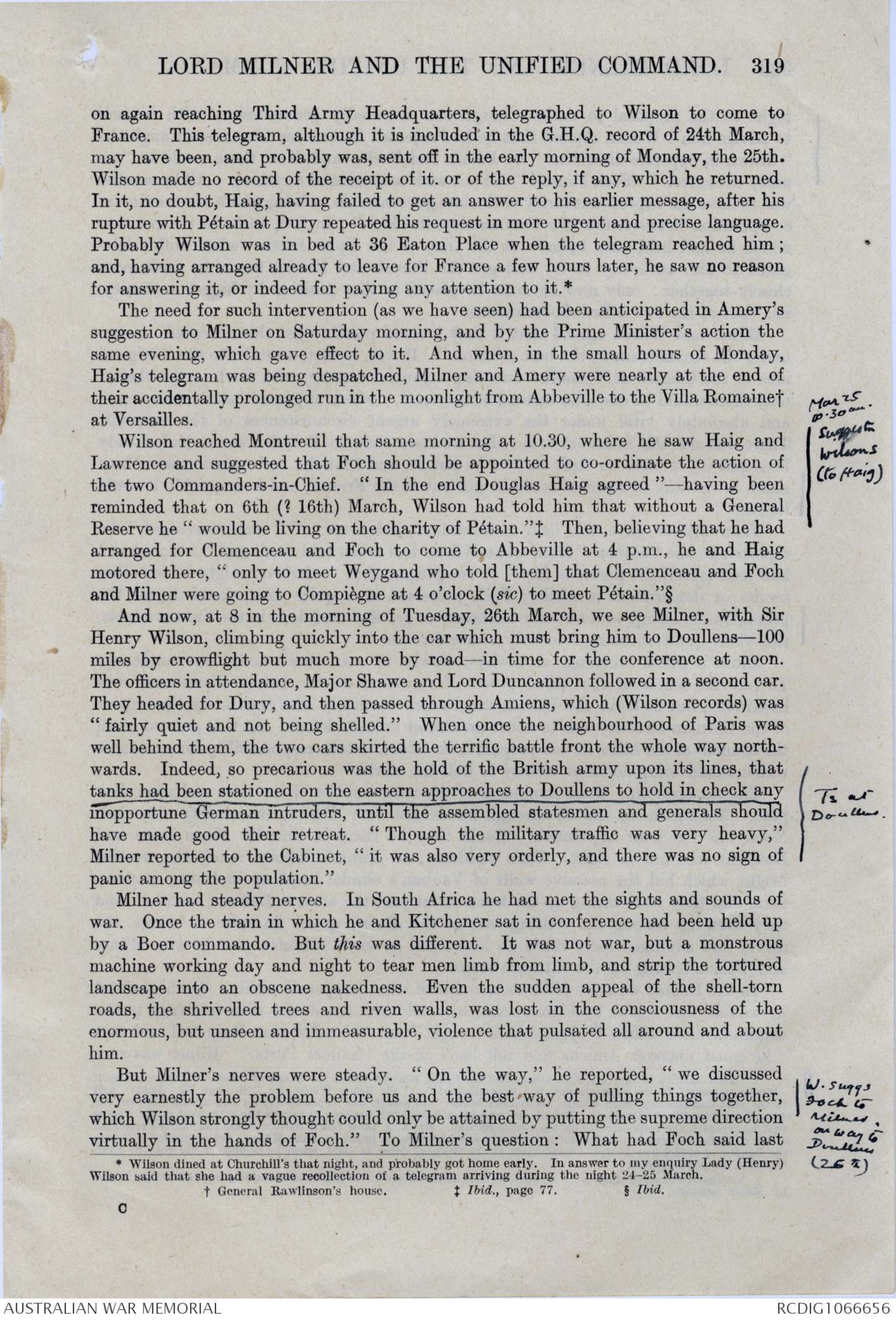
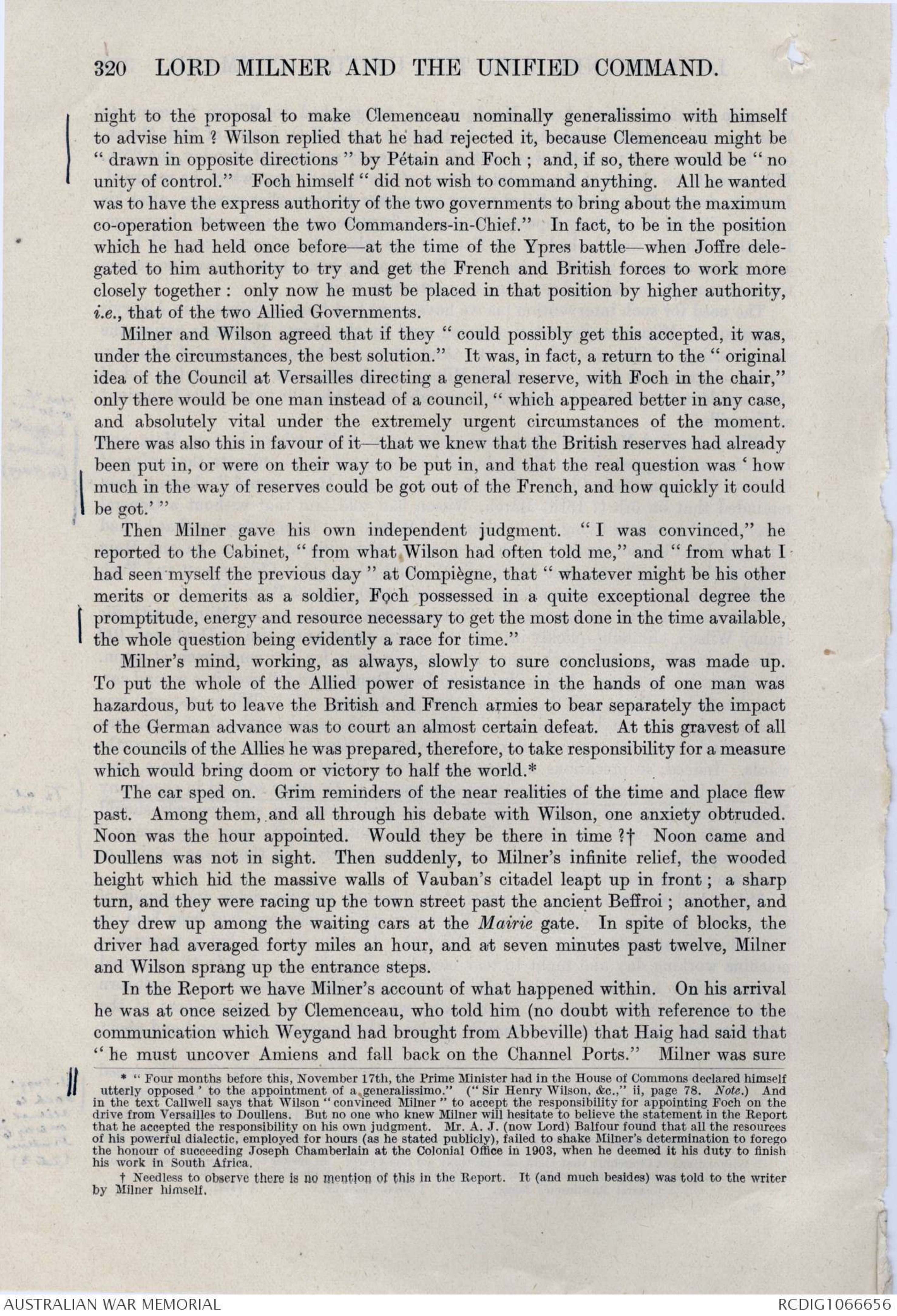
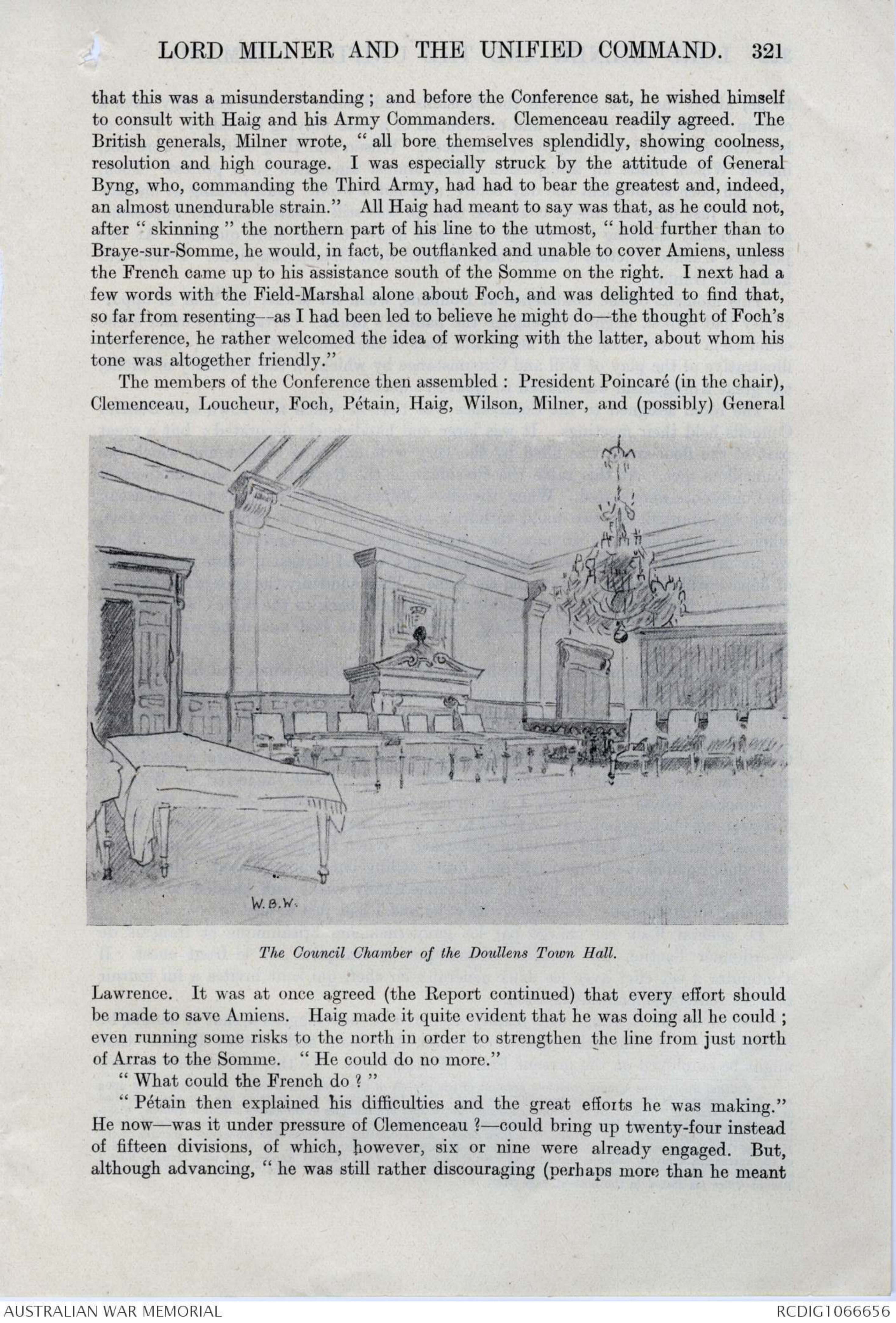
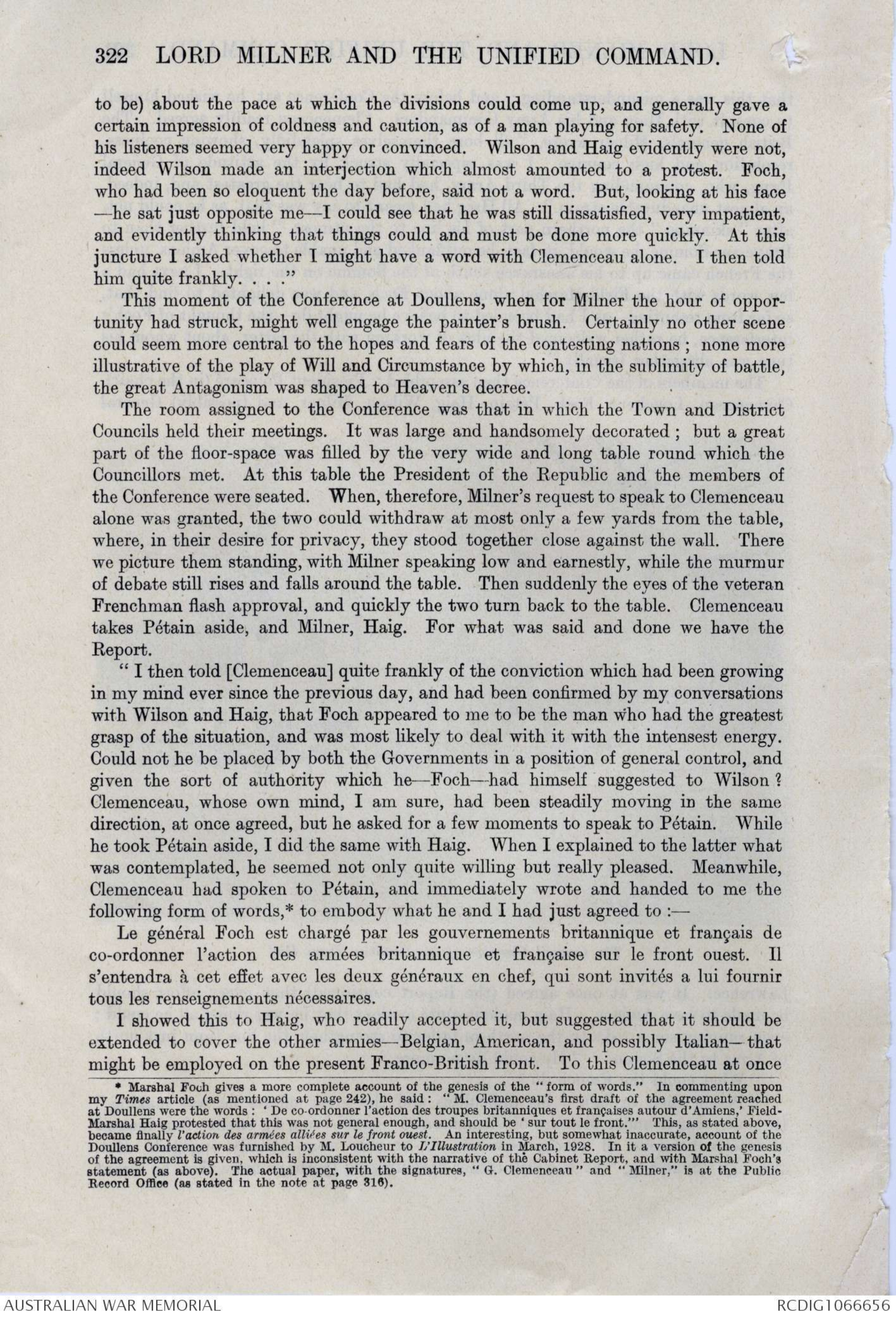
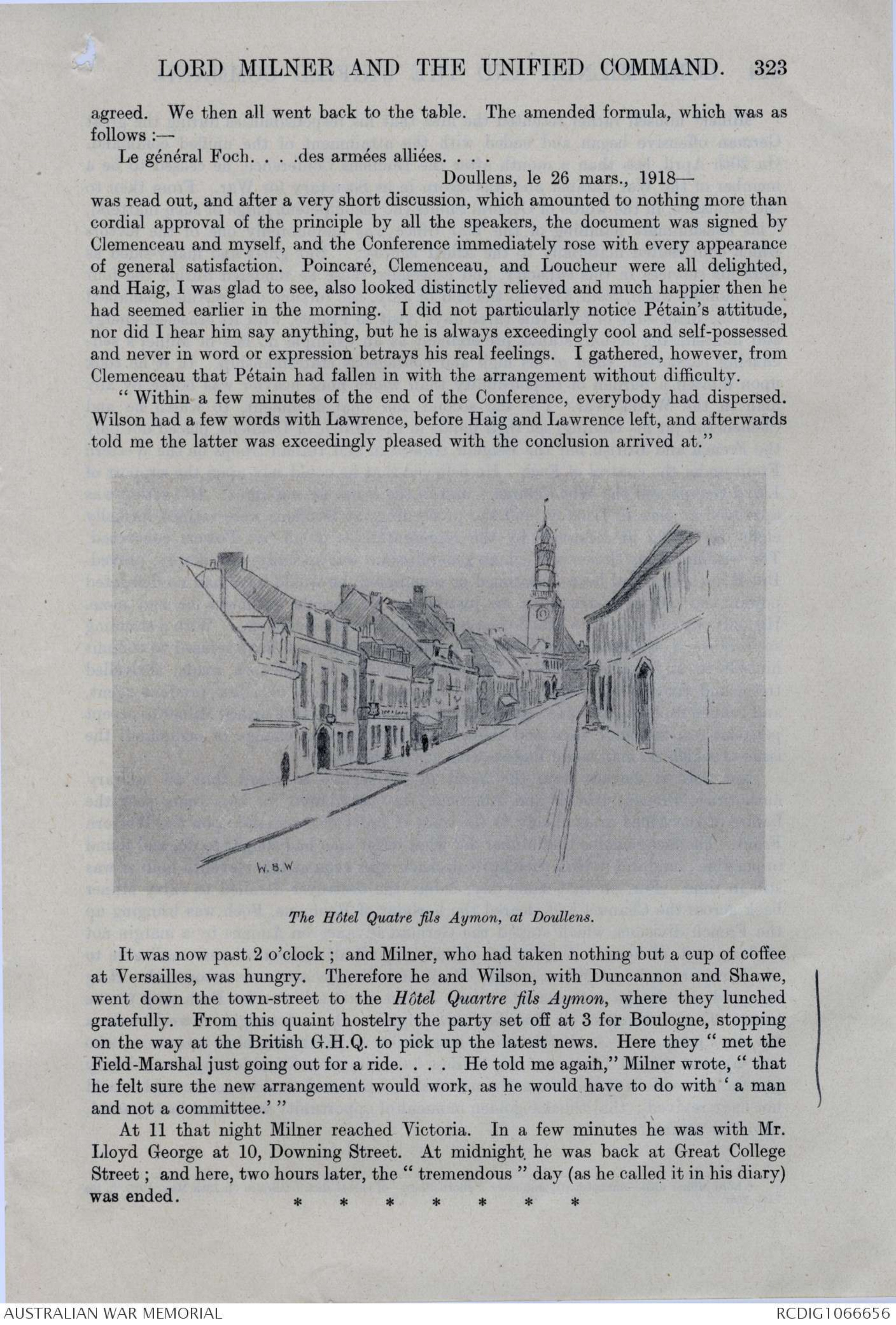
244
LORD MILNER AND THE UNIFIED COMMAND.
as yet, unintelligible. For the first time England felt the menace of a broken Front.
Yet the churches were filled : for on that day many infrequent worshippers sought
within their walls a respite from the harassing images which beset their minds. Some
found hope, as well as rest. A Just God would not suffer the unjust to prevail. It
was moments of peril like this that evoked the highest qualities of statesmen and
captains of war. There might be such men, somewhere, even now emerging.
At the time the church-goers were dispersing, Milner, with Major Shawe of the
Rifle Brigade in attendance, was taking his seat in the train for Folkestone. The
hurried preparations in which he had spent the morning had been interrupted by
conversations on the telephone with Mr. Lloyd George and by visitors—among the
latter being General Smuts, a colleague in the War Cabinet of Six. But he had
managed to catch the 12.50 at Charing Cross. There was some delay at Folkestone
in arranging for his passage across the Channel, and it was half past six when he
reached Boulogne. Here he found Mr. Amery (who had come from Versailles) waiting
for him with two cars. They went straight to the (advanced) British Headquarters
at Haig’s House, Beaurepaire, near Montreuil. The Commander-in-Chief was away,
but Milner saw General (J. H.) Davidson there, and they took on with them Brigadier-
General Wake, who was on the staff of General Rawlinson, the permanent British
military representative on the Supreme War Council,* and bound like themselves for
Versailles. From Wake, Milner learnt more of the immediate situation at the Front,
and of the (as yet) unexplained break-down of the (British) Fifth Army.
At Abbeville, the Headquarters of the British Lines of Communication, the party
stopped to dine. Then they resumed their journey. It was a moonlight night, but
the driver lost his way after passing Pontoise, with the result that General Rawlinson’s
house at Versailles was not reached until half past two in the morning. Here Milner
found a telegram from G.H.Q., dated 11.30 p.m., which said that the general
situation had somewhat improved. He then went “dog-tired” to bed ; but he was
down again before eight the same morning (Monday, 25th March). He began the day
by hearing all that Rawlinson and Wake could tell him of the military position.
Then at 10, in response to a message from Clemenceau, he motored to Paris, taking
Mr. Amery with him.
_________________
*Rawlinson had succeeded Wilson, when on 19th February the latter became C.I.G.S. Montreuil, the British
G.H.Q., was half-way between Boulogne and Abbeville.
(To be concluded.)
_________________MATERIAL FOR EMPIRE TALKS : A SUGGESTION.It has struck me that much might be done to popularize Empire travel and to encouragethe purchase by Britons at home of Empire products, if Fellows living in the outlying partsof the Empire would endeavour to collect material for a talk (if possible, illustrated by a fewlantern slides) on the habits and customs of the people, trade conditions, produce, scenery,travel conditions, &c., of the country they live in.
I venture to make this suggestion because of an experience which befell me during mylast leave. It was my privilege to become a member of a literary society near my home,and I was invited to contribute a paper on the Colony in which I live—Ceylon. Fortunately,I had collected a lot of odds and ends of more or less interesting information and, throughthe courtesy of a friend, I was able to illustrate my talk with some photographic views inthe shape of lantern slides. It must often happen that opportunities occur for such a talk as Ihave outlined. Most men who have lived for any time outside the British Isles could give aninteresting account of their own particular corner of the Empire, and I think it extremelylikely that many of the large number of Fellows who annually arrive home on leave wouldfind opportunities for a bit of Empire propaganda on the lines I have indicated.
Ceylon.
L. A. A. HAYTER.
315
WESTERN AUSTRALIA’S FIRST CENTURY.
One of the conditions of the foundation of the colony was that it was not to suffer
from the taint of the convict system, and unquestionably that condition was an
important factor in inducing many settlers with wives and families to go there. The
difficulties arising from the scarcity of labour and other circumstances graduallybrought about a change of opinion and finally a petition from the colonists, who thennumbered some 6,000, that convicts be sent to the country was granted. The firstconvicts arrived in 1850. They were employed on public works and in other waysand their presence meant the expenditure of money to the advantage of the generalcommunity. There was a cessation of transportation to Westem Australia in 1868when the population had grown to 22,700. The fears that the presence of convictswould have tainted the community have proved utterly groundless. To-day nopart of the Empire is more moral or law abiding.
The discovery of gold at Coolgardie, in 1892, and the opening up later at Kalgoorlieof the wealth of the Golden Mile, ushered in an era of progress and prosperity. Thepopulation, which in 1891 was 53,000, rose quickly, and in 1900 it was 180,000,whilst in the same period the yearly revenue of the Government advanced from£500,000 to nearly £3,000,000.
The immense capabilities of Western Australia as one of the world’s great wheatproducing countries, were only realized some ten or eleven years ago. In 1908 theacreage under wheat was only 279,000 acres, but to-day it is almost 3,000,000 acres,and vast areas remain to be opened up. It is expected that next season’s crop will bein the neighbourhood of 50,000,000 bushels. The wool produced amounts to some50,000,000 Ibs. annually and the number of sheep is increasing. Fruit growing israpidly creating a large export market and other industries are also advancing.To-day the annual revenue amounts to some £10,000,000 apart from what is collectedby the Federal authorities, and the population is over 405,000. There is, perhaps,no more progressive or prosperous part of the Empire.
A contrast may well be made between the prospects of migrants who went toWestern Australia 100 years ago and those who go there to-day. The new arrivalnowadays would find the harbour at Fremantle crowded with shipping. Perth,with a population of 190,000, is one of the most picturesque and up-to-date cities ofthe Empire. Where there were not even tracks a century ago, there are now no lessthan 4,000 miles of railways open for traffic. There is one motor vehicle for every15 of the population and there is an excellent airways service between Perth in thesouth and Wyndham in the north. An east-west aviation service across thecontinent is just being inaugurated. Roads and bridges have been made even in themost remote and least populated areas; forests have been felled and bush landscleared, though many millions of acres yet remain to be cultivated; the AgriculturalBank lends money to new settlers to tide them over the initial years of struggle;agriculturists have the assistance of expert scientists who are paid by the Government;schools exist everywhere and in some districts where the children are scattered overwide areas they are driven to and from school at the expense of the State; educationis free and no fees are charged even at the University of Westem Australia. Thepath has been made smooth indeed for fresh arrivals, and it has been made so by thecourage and labours of those pioneers who left England 100 years ago to establisha colony in an unknown wilderness.
__________-
MR. ERIC LOUW, the new High Commissioner for the Union of South Africa, was welcomedat luncheon by the Council of the Royal Empire Society, on May 8th, when Colonel WestonJarvis, in the absence of Sir John Sandeman Allen, took the Chair.
316
LORD MILNER AND THE UNIFIED COMMAND.
A Chapter in the History of the Great War.
By W. BASIL WORSFOLD.
PART II.—THE SOLUTION.
AT the Ministry of War, Clemenceau, hurrying into the ante-room with hands
outstretched, and a look of joy upon his face, greeted Milner warmly. (My dear
Friend, how relieved I am to see you.) Then for half an hour, or longer, the tall and
rather stately Englishman and the thick-set Frenchman were closeted together.
Of the interview itself Milner reported* to the War Cabinet, that the French Prime
Minister “was in great form and very full of fight, and, while realizing the gravity of
the situation, showed not the slightest sign either of despondency or confusion."
He expressed the view that Haig and Pétain must throw in at once their reserves to
stop the breach between the British and French lines; and “evidently hoped that
Haig would be able to bring down more reserves from the north.”. He said “it would
be necessary to bring pressure to bear upon Pétain to do more in that direction. He
was most anxious to meet the British and French Commanders-in-Chief. He
(Clemenceau) heard that Sir Henry Wilson was arriving at Abbeville to meet Haig,
and he was trying to get them to come on to Compiègne, Pétain’s Headquarters,
where he could join them in the course of the afternoon. He told me to hold myself
in readiness to start at a moment’s notice on a message from him after 2 o’clock."
The Report tells us nothing, however, of what is perhaps of even greater interest
—what Milner himself said to Clemenceau. Happily, Mr. Amery’s recollection can
make good the omission. On leaving the Ministry Milner told Amery that he had
impressed upon Clemenceau that he (Milner) would not feel justified in entrusting the
unified control of the two Armies to Pétain : for that Foch would be necessary. And
he added, “I suppose you and Henry [Wilson) are right about Foch.” For, as yet,
Milner had no personal conviction of the outstanding capacity of the great French
captain of war. In the afternoon, as will be seen, he got the direct evidence on this
point, which in the morning was wanting.
The arrival of Sir H. Wilson in France, announced by Clemenceau, was unexpected
by Milner: since the circumstances which brought it about (to be related in the sequel)
had occurred after Milner had left London. But on returning to Versailles Milner
found a message from Wilson, asking him to meet him (Wilson) at Abbeville at three
o’clock. It was already, however, half past twelve, and impossible to reach Abbeville
by three. Moreover, Clemenceau was trying to get both Wilson and Haig to come
to Compiègne, and Milner was pledged to go wherever Clemenceau might arrange
that the conference should be held. He decided, therefore, not to change his plans;
____________
*The Report is dated “2, Whitehall Gardens, 27th March, 1918 " (the offices of the War Cabinet). He began
it on the morning after his return to London, and finished it on the following day (March 28th). He then showed
it to Sir H. Wilson, who had no additions or amendments to suggest, and gave it to the Cabinet. It contains an
hour-to-hour record of his three days’ absence in France. The document was absolutely secret, and from a historical
point of view it is one of the most vitally important of all the War-time records. From the moment it passed into the
archives of the War Cabinet, Milner heard nothing more about it, until in the early part of 1921 the substance of it
was published in the London Press and afterwards the complete text appeared as a supplement to The New Statesman
of 23rd April, 1921. The manner in which so confidential a document came into the hands of the Press remains a
mystery. The quotations given here are taken from The New Statesman text, after comparison with Milner’s own
typewritten copy. But valuable as the Cabinet Report is as a record of the facts, it does not do justice to Milner
in two respects : (1) the selection of Foch in spite of the estrangement between Foch and Clemenceau, and (2) the
moral greatness of Milner’s assumption of personal responsibility. In addition to oral and other evidence which I
have embodied in the text, it can now be supplemented by the entries in Milner’s Diary for the four days March 23—26,
1918, copies of which, deposited by Lady Milner in May, 1928, at the Record Office, are available for students ; and
by Sir Henry Wilson’s Diary (published in 1927). This latter gives details of Wilson’s doings on March 23—26,
but, naturally, his account of those in which he was directly associated with Milner in France, being written from his
own personal point of view, give an interpretation of the parts respectively played by the two men, which is sometimes
at variance with the narrative of the Cabinet Report. Milner’s own copy of the Report and the actual document
signed by Clemenceau and Milner at Doullens were also deposited at the Record Office by Lady Milner.
317
LORD MILNER AND THE UNIFIED COMMAND.
and after lunch, and a further talk with Rawlinson, he motored to the British Embassy
in Paris. Here he received the expected message from Clemenceau, which asked him
to be at the Ministry of War at three. At that hour, accordingly, President Poincaré,
Clemenceau, M. Loucheur (Minister of Munitions), Foch, and Milner (accompanied by
Major Shawe) all motored down in their several cars to Pétain’s Headquarters at
Compiègne.
And now, in the tragedy of this supreme crisis, Comedy chose to play an interlude.
Whether the Muse’s trickster visited Paris or Versailles is not on record: but, be this
as it may, the convoking messages sent the British and French generals in opposite
directions—the British to Abbeville and the French to Compiègne. At Abbeville
where Haig and Wilson were awaiting the French, the special train from Paris brought
only General Weygand; by whom, however, Haig took opportunity to send back an
emphatic statement of his views of the strategic requirements of the situation. At
Compiègne there were no British generals at all. Nevertheless, a conference was held
at Pétain’s Headquarters, which sat from 5 to 7; and it was not without results.
Poincaré took the chair. Pétain, the Report says, “ took a very pessimistic view
of the condition of the Fifth Army. . . .,” now placed by Haig under his (Pétain’s)
orders. “He was bringing up divisions from the south and west. . . . six, held in
near reserve, were engaged. . . . This was all he could do at the moment, though
he hoped to do more presently; but he could not neglect the danger of the Germans
pushing down the Oise from about Noyon nor a threatened attack in the region of
Reims."
Pétain’s cautious, almost paralytic, strategy roused Foch to speak his mind. To
him the danger of a break-in, between the British and French armies, upon Amiens
was so formidable that “risks must be taken in other directions. .. . More
divisions could be thrown in, and more quickly, even if in less complete formation,"
than would, in ordinary circumstances, be desirable. This and much more. The
"long and energetic” statement, as the Report calls it, gave Milner just the personal
assurance of Foch’s qualities that had been wanting in the morning.
Poincaré and Clemenceau (the Report continues) were evidently in sympathy with
Foch’s view; and Milner was asked for his opinion. What could the British do?
To this he replied that, while it was impossible not to agree in principle with the
policy of defending Amiens, he could not give any opinion on the precise course to be
followed, without having had the opportunity of consulting Haig and Wilson. This,
he thought, must be remedied by having another meeting the next day. Clemenceau
agreed; and it was arranged to hold a second conference at Dury, five miles south
of Amiens, at 11 in the morning. Thereupon, the Conference rose; but before the
French Ministers returned to Paris, Milner had a few minutes’ private conversation
with Clemenceau. In this he impressed upon the latter that (1) the British Third
Army, with the reliefs which were being sent to it from the north, was doing all it
could, and (2) he had some misgivings as to whether Pétain was prepared to take
sufficient risks to bring up all possible French reserves, on which (as it seemed to
Milner) “everything depended.” Again Clemenceau agreed; but he added that
Pétain was doing much more than he had originally contemplated, and might do more
still. He also shared Milner’s preference for Foch’s attitude.
Milner was back at Versailles by 9 o’clock. Here, to his delight, he found Wilson,
just arrived from Abbeville. In the meantime a message had come from Haig. He
wished the conference to take place at Doullens, north of Amiens, as he had to be
there in any case to meet his three Army Commanders; and at 12 instead of 11 o’clock.
“This was arranged by telephone with Paris.” Later, Milner talked to Wilson, who
318
LORD MILNER AND THE UNIFIED COMMAND.
spoke of what had passed between him and Haig at Montreuil and Abbeville; and
Rawlinson and Amery took part in the discussion. “Everybody seemed to be agreed
now,” Milner reported to the Cabinet, “that the object of the Germans was to push
hard for Amiens through the gap south of the Somme, at the same time directing an
attack pointing north-west against the English and south-west against the French,
so as to widen the breach between them. Our object must be by all means in our
power to keep touch with the French and fill up the gap, while, of course, resisting these
attacks. The greatest promptitude in bringing up reserves and complete co-operation
between the Armies was necessary. We discussed the personal difficulties of effecting
such co-operation, and Wilson made the suggestion ”that both Commanders-in-Chief
might leave it to Clemenceau to take the decisions necessary to secure these two
paramount necessities. He was on the spot, and would, no doubt, be guided by Foch.
This seemed a good suggestion to Milner, and at 10.30 p.m. Wilson motored to Paris
to put it before Foch. Wilson had not returned, when, at midnight, Milner went to
bed. He had not found time for much sleep in the two preceding nights, and tomorrow
he had another heavy day—and an early start—before him.
[*Wilson
to
Milner
- sugg's
Clemenceau &
puts it
to Foch.
Foch says
No*]
In the meantime, i.e., on the night of Milner’s journey to Versailles (24th-25th
March) matters between Haig and Pétain had reached a deadlock. Of this the
Cabinet Report says nothing. On the contrary, Milner’s mention in it* of his surprise
at the readiness shown at Doullens by Haig to accept the appointment of Foch implies
that this incident, which in itself would have sufficed to explain Haig’s change of
attitude, was unknown to him. Such ignorance, in view of the rapidity with which
the unified command was accomplished, would not be strange. Between Milner’s
first meeting with Clemenceau at the Ministry of War in Paris, and the close of the
Doullens Conference only twenty-eight hours elapsed. Nor does the Report notice
the unexpected character of Wilson’s arrival at the Front. Happily, both these
omissions can be supplied from facts recorded by the British Headquarters Staff, and
by Wilson himself.
After Milner had left London on Sunday (24th), more bad news reached the War
Office; and at 5.30 p.m., Wilson was rung up by Foch in Paris, and agreed to come
over to see him.† At about 7 p.m., when in conference at 10, Downing Street, he
received a message from Haig, sent or ’phoned on from the War Office, also asking
him to cross over to France.† His reply—probably to the effect that he had already
decided to cross to-morrow—would appear not to have reached Haig, because he
(Haig) was moving rapidly from place to place behind the British line. And for the
same reason Haig knew nothing of Milner’s arrival at Montreuil until he got back to
G.H.Q. on Monday morning. But on receiving this message Wilson, or his secretary
made the arrangements necessary to enable him to start for the Front the next
morning at 6.50, travelling by "special” and destroyer.
[*Wilson
starts
mg of 25th*]
On the same Sunday evening at 8 p.m. General Sir Herbert Lawrence, Haig’s
Chief of Staff, who earlier in the day had seen General Fayolles, Pétain’s Chief of Staff,
at Villers Bretonneux, met Haig at Third Army Headquarters§ at Beauquesne,
some 12 miles north of Amiens. At 11 p.m. Haig and Lawrence met Pétain at Dury
(five miles south of Amiens). Here the French Commander-in-Chief informed them
that he had issued orders that, in case the enemy continued to press his attacks on
Amiens, the French divisions concentrating about Mondidier (to re-inforce the British
right) were to fall back south-west and cover Paris. This surprising statement
brought the conference between the two Commanders-in-Chief to an abrupt close.
And Haig, deeming any further attempt to secure Pétain’s co-operation to be hopeless,
[*Meets at
Dury
11p. 24th*]
__________
* See forward, page 322. †"Sir Henry Wilson, &c." ; ii, page 76. ‡ Ibid.
§ General Byng (now Lord Byng of Vimy) was in command.
319
LORD MILNER AND THE UNIFIED COMMAND.
on again reaching Third Army Headquarters, telegraphed to Wilson to come to
France. This telegram, although it is included in the G.H.Q. record of 24th March,
may have been, and probably was, sent off in the early morning of Monday, the 25th.
Wilson made no record of the receipt of it. or of the reply, if any, which he returned.
In it, no doubt, Haig, having failed to get an answer to his earlier message, after his
rupture with Pétain at Dury repeated his request in more urgent and precise language.
Probably Wilson was in bed at 36 Eaton Place when the telegram reached him;
and, having arranged already to leave for France a few hours later, he saw no reason
for answering it, or indeed for paying any attention to it.*
The need for such intervention (as we have seen) had been anticipated in Amery’s
suggestion to Milner on Saturday morning, and by the Prime Minister’s action the
same evening, which gave effect to it. And when, in the small hours of Monday,
Haig’s telegram was being despatched, Milner and Amery were nearly at the end of
their accidentally prolonged run in the moonlight from Abbeville to the Villa Romaine†
at Versailles.
[*Mar 25
00.30am.
Suggestn
Wilsons
(to Haig)*]
Wilson reached Montreuil that same morning at 10.30, where he saw Haig and
Lawrence and suggested that Foch should be appointed to co-ordinate the action of
the two Commanders-in-Chief. “ In the end Douglas Haig agreed ”—having been
reminded that on 6th (? 16th) March, Wilson had told him that without a General
Reserve he “ would be living on the charity of Pétain.”‡ Then, believing that he had
arranged for Clemenceau and Foch to come to Abbeville at 4 p.m., he and Haig
motored there, “ only to meet Weygand who told [them] that Clemenceau and Foch
and Milner were going to Compiègne at 4 o’clock (sic) to meet Pétain. §
And now, at 8 in the morning of Tuesday, 26th March, we see Milner, with Sir
Henry Wilson, climbing quickly into the car which must bring him to Doullens—100
miles by crowflight but much more by road—in time for the conference at noon.
The officers in attendance, Major Shawe and Lord Duncannon followed in a second car.
They headed for Dury, and then passed through Amiens, which (Wilson records) was
“ fairly quiet and not being shelled.” When once the neighbourhood of Paris was
well behind them, the two cars skirted the terrific battle front the whole way northwards. Indeed, so precarious was the hold of the British army upon its lines, that
tanks had been stationed on the eastern approaches to Doullens to hold in check any
inopportune German intruders, until the assembled statesmen and generals should
have made good their retreat. “ Though the military traffic was very heavy,"
Milner reported to the Cabinet, “ it was also very orderly, and there was no sign of
panic among the population.
[*Ts at
Doullens*]
Milner had steady nerves. In South Africa he had met the sights and sounds of
war. Once the train in which he and Kitchener sat in conference had been held up
by a Boer commando. But this was different. It was not war, but a monstrous
machine working day and night to tear men limb from limb, and strip the tortured
landscape into an obscene nakedness. Even the sudden appeal of the shell-torn
roads, the shrivelled trees and riven walls, was lost in the consciousness of the
enormous, but unseen and immeasurable, violence that pulsated all around and about
him.
But Milner’s nerves were steady. “ On the way,” he reported, “we discussed
very earnestly the problem before us and the best-way of pulling things together,
which Wilson strongly thought could only be attained by putting the supreme direction
virtually in the hands of Foch.” To Milner’s question: What had Foch said last
[*W suggs
Foch to
Milner
on way to
Doullens
(25th)*]
____________
*Wilson dined at Churchill's that night, and probably got home early. In answer to my enquiry Lady (Henry)
Wilson said that she had a vague recollection of a telegram arriving during the night 24-25 March.
†General Rawlinson’s house. ‡ Ibid., page 77. § Ibid.
C
320 LORD MILNER AND THE UNIFIED COMMAND.
night to the proposal to make Clemenceau nominally generalissimo with himself
to advise him ? Wilson replied that he had rejected it, because Clemenceau might be
"drawn in opposite directions ” by Pétain and Foch ; and, if so, there would be “ no
unity of control.” Foch himself “ did not wish to command anything. All he wanted
was to have the express authority of the two governments to bring about the maximum
co-operation between the two Commanders-in-Chief.” In fact, to be in the position
which he had held once before—at the time of the Ypres battle—when Joffre delegated
to him authority to try and get the French and British forces to work more
closely together : only now he must be placed in that position by higher authority,
i.e., that of the two Allied Governments.
Milner and Wilson agreed that if they “ could possibly get this accepted, it was,
under the circumstances, the best solution.”. It was, in fact, a return to the “ original
idea of the Council at Versailles directing a general reserve, with Foch in the chair,
only there would be one man instead of a council,“ which appeared better in any case,
and absolutely vital under the extremely urgent circumstances of the moment.
There was also this in favour of it—that we knew that the British reserves had already
been put in, or were on their way to be put in, and that the real question was 'how
much in the way of reserves could be got out of the French, and how quickly it could
be got.'"
Then Milner gave his own independent judgment. “I was convinced,” he
reported to the Cabinet, “from what, Wilson had often told me,” and “from what I
had seen myself the previous day ” at Compiègne, that “whatever might be his other
merits or demerits as a soldier, Foch possessed in a quite exceptional degree the
promptitude, energy and resource necessary to get the most done in the time available,
the whole question being evidently a race for time."
Milner’s mind, working, as always, slowly to sure conclusions, was made up.
To put the whole of the Allied power of resistance in the hands of one man was
hazardous, but to leave the British and French armies to bear separately the impact
of the German advance was to court an almost certain defeat. At this gravest of all
the councils of the Allies he was prepared, therefore, to take responsibility for a measure
which would bring doom or victory to half the world.*
The car sped on. Grim reminders of the near realities of the time and place flew
past. Among them, and all through his debate with Wilson, one anxiety obtruded.
Noon was the hour appointed. Would they be there in time?† Noon came and
Doullens was not in sight. Then suddenly, to Milner’s infinite relief, the wooded
height which hid the massive walls of Vauban’s citadel leapt up in front ; a sharp
turn, and they were racing up the town street past the ancient Beffroi ; another, and
they drew up among the waiting cars at the Mairie gate. In spite of blocks, the
driver had averaged forty miles an hour, and at seven minutes past twelve, Milner
and Wilson sprang up the entrance steps.
In the Report we have Milner’s account of what happened within. On his arrival
he was at once seized by Clemenceau, who told him (no doubt with reference to the
communication which Weygand had brought from Abbeville) that Haig had said that
“he must uncover Amiens and fall back on the Channel Ports.”, Milner was sure
______________
* "Four months before this, November 17th, the Prime Minister had in the House of Commons declared himself
utterly opposed' to the appointment of a, generalissimo." ("Sir Henry Wilson, &c.,” ii, page 78. Note.) And
in the text Callwell says that Wilson “convinced Milner” to accept the responsibility for appointing Foch on the
drive from Versailles to Doullens. But no one who knew Milner will hesitate to believe the statement in the Report
that he accepted the responsibility on his own judgment. Mr. A. J. (now Lord) Balfour found that all the resources
of his powerful dialectic, employed for hours (as he stated publicly), failed to shake Milner’s determination to forego
the honour of succeeding Joseph Chamberlain at the Colonial Office in 1903, when he deemed it his duty to finish
his work in South Africa.
† Needless to observe there is no mention of this in the Report. It (and much besides) was told to the writer
by Milner himself.
LORD MILNER AND THE UNIFIED COMMAND. 321
that this was a misunderstanding; and before the Conference sat, he wished himself
to consult with Haig and his Army Commanders. Clemenceau readily agreed. The
British generals, Milner wrote, “ all bore themselves splendidly, showing coolness,
resolution and high courage. I was especially struck by the attitude of General
Byng, who, commanding the Third Army, had had to bear the greatest and, indeed,
an almost unendurable strain.” All Haig had meant to say was that, as he could not,
after “ skinning ” the northern part of his line to the utmost, “ hold further than to
Braye-sur-Somme, he would, in fact, be outflanked and unable to cover Amiens, unless
the French came up to his assistance south of the Somme on the right. I next had a
few words with the Field-Marshal alone about Foch, and was delighted to find that,
so far from resenting—as I had been led to believe he might do—the thought of Foch’s
interference, he rather welcomed the idea of working with the latter, about whom his
tone was altogether friendly."
The members of the Conference then assembled : President Poincaré (in the chair),
Clemenceau, Loucheur, Foch, Pétain, Haig, Wilson, Milner, and (possibly) General
Sketch - see original
The Council Chamber of the Doullens Town Hall.
Lawrence. It was at once agreed (the Report continued) that every effort should
be made to save Amiens. Haig made it quite evident that he was doing all he could;
even running some risks to the north in order to strengthen the line from just north
of Arras to the Somme. “ He could do no more."
“ What could the French do ?"
“Pétain then explained his difficulties and the great efforts he was making."
He now—was it under pressure of Clemenceau ?—could bring up twenty-four instead
of fifteen divisions, of which, however, six or nine were already engaged. But,
although advancing, “ he was still rather discouraging (perhaps more than he meant
322 LORD MILNER AND THE UNIFIED COMMAND.
to be) about the pace at which the divisions could come up, and generally gave a
certain impression of coldness and caution, as of a man playing for safety. None of
his listeners seemed very happy or convinced. Wilson and Haig evidently were not,
indeed Wilson made an interjection which almost amounted to a protest. Foch,
who had been so eloquent the day before, said not a word. But, looking at his face
-he sat just opposite me—I could see that he was still dissatisfied, very impatient,
and evidently thinking that things could and must be done more quickly. At this
juncture I asked whether I might have a word with Clemenceau alone. I then told
him quite frankly. . .."
This moment of the Conference at Doullens, when for Milner the hour of opportunity
had struck, might well engage the painter’s brush. Certainly no other scene
could seem more central to the hopes and fears of the contesting nations ; none more
illustrative of the play of Will and Circumstance by which, in the sublimity of battle,
the great Antagonism was shaped to Heaven’s decree.
The room assigned to the Conference was that in which the Town and District
Councils held their meetings. It was large and handsomely decorated; but a great
part of the floor-space was filled by the very wide and long table round which the
Councillors met. At this table the President of the Republic and the members of
the Conference were seated. When, therefore, Milner’s request to speak to Clemenceau
alone was granted, the two could withdraw at most only a few yards from the table
where, in their desire for privacy, they stood together close against the wall. There
we picture them standing, with Milner speaking low and earnestly, while the murmur
of debate still rises and falls around the table. Then suddenly the eyes of the veteran
Frenchman flash approval, and quickly the two turn back to the table. Clemenceau
takes Pétain aside, and Milner, Haig. For what was said and done we have the
Report.
“I then told [Clemenceau) quite frankly of the conviction which had been growing
in my mind ever since the previous day, and had been confirmed by my conversations
with Wilson and Haig, that Foch appeared to me to be the man who had the greatest
grasp of the situation, and was most likely to deal with it with the intensest energy.
Could not he be placed by both the Governments in a position of general control, and
given the sort of authority which he—Foch—had himself suggested to Wilson?
Clemenceau, whose own mind, 1 am sure, had been steadily moving in the same
direction, at once agreed, but he asked for a few moments to speak to Pétain. While
he took Pétain aside, I did the same with Haig. When I explained to the latter what
was contemplated, he seemed not only quite willing but really pleased. Meanwhile
Clemenceau had spoken to Pétain, and immediately wrote and handed to me the
following form of words,* to embody what he and I had just agreed to :-
Le général Foch est chargé par les gouvernements britannique et français de
co-ordonner l’action des armées britannique et française sur le front ouest. I
s’entendra à cet effet avec les deux généraux en chef, qui sont invités a lui fournir
tous les renseignements nécessaires.
I showed this to Haig, who readily accepted it, but suggested that it should be
extended to cover the other armies—Belgian, American, and possibly Italian—that
might be employed on the present Franco-British front. To this Clemenceau at once
______________
*Marshal Foch gives a more complete account of the genesis of the “ form of words." In commenting upon
my Times article (as mentioned at page 242), he said : “M. Clemenceau’s first draft of the agreement reached
at Doullens were the words : * De co-ordonner l’action des troupes britanniques et françaises autour d’Amiens,’ Field-
Marshal Haig protested that this was not general enough, and should be 'sur tout le front.'”
This, as stated above,
became finally l’action des armées alliées sur le front ouest. An interesting, but somewhat inaccurate, account of the
Doullens Conference was furnished by M. Loucheur to L’Illustration in March, 1928. In it a version of the genesis
of the agreement is given, which is inconsistent with the narrative of thè Cabinet Report, and with Marshal Foch's
statement (as above). The actual paper, with the signatures, “ G. Clemenceau ” and “Milner," is at the Public
Record Office (as stated in the note at page 316).
LORD MILNER AND THE UNIFIED COMMAND. 323
agreed. We then all went back to the table. The amended formula, which was as
follows:
Le général Foch. . . .des armées alliées.
Doullens, le 26 mars., 1918 -
was read out, and after a very short discussion, which amounted to nothing more than
cordial approval of the principle by all the speakers, the document was signed by
Clemenceau and myself, and the Conference immediately rose with every appearance
of general satisfaction. Poincaré, Clemenceau, and Loucheur were all delighted,
and Haig, I was glad to see, also looked distinctly relieved and much happier then he
had seemed earlier in the morning. I did not particularly notice Pétain’s attitude,
nor did I hear him say anything, but he is always exceedingly cool and self-possessed
and never in word or expression betrays his real feelings. I gathered, however, from
Clemenceau that Pétain had fallen in with the arrangement without difficulty.
" Within a few minutes of the end of the Conference, everybody had dispersed.
Wilson had a few words with Lawrence, before Haig and Lawrence left, and afterwards
told me the latter was exceedingly pleased with the conclusion arrived at."
Sketch - see original
The Hôtel Quatre fils Aymon, at Doullens.
It was now past 2 o’clock; and Milner, who had taken nothing but a cup of coffee
at Versailles, was hungry. Therefore he and Wilson, with Duncannon and Shawe,
went down the town-street to the Hôtel Quartre fils Aymon, where they lunched
gratefully. From this quaint hostelry the party set off at 3 for Boulogne, stopping
on the way at the British G.H.Q. to pick up the latest news. Here they “ met the
Field-Marshal just going out for a ride. . . . He told me again,” Milner wrote, “ that
he felt sure the new arrangement would work, as he would have to do with 'a man
and not a committee.' "
At 11 that night Milner reached Victoria. In a few minutes he was with Mr.
Lloyd George at 10, Downing Street. At midnight he was back at Great College
Street ; and here, two hours later, the “ tremendous ” day (as he called it in his diary)
was ended.
 Sandy Mudie
Sandy MudieThis transcription item is now locked to you for editing. To release the lock either Save your changes or Cancel.
This lock will be automatically released after 60 minutes of inactivity.